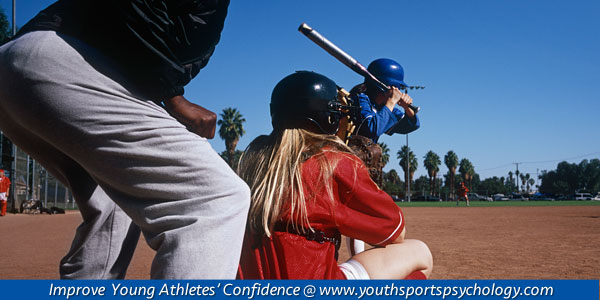
Helping Sports Kids Take Risks
Darren, a sports dad, has a classic question about kids who perform well in practice, but freeze up during games.
“My child is a 10-year-old hockey player. He is very good and has a great work ethic. He is a great practice player but when it comes to games he pulls back and I would say he plays ‘safe.’”
This parent wants to know how to help his son take more risks during games and “want the puck more.”
Darren’s question really emphasizes the need for mental game coaching. A good option to solve this problem—and it’s a common, confidence-busting one—is to use sports psychology strategies.
Here’s the challenge:
Kids like Darren’s son have fears that prevent them from trusting what they learned in practice. If they don’t trust in their skills, they perform tentatively, like Darren’s son.
These kids avoid taking risks, which we see a lot in sports. And when they avoid taking risks, they don’t grow as athletes or play up to their potential. You have to remove the fear to help kids “go for it” or “want the puck” before can kids really improve, trust in their skills, and perform well.
The bottom line:
Playing it safe is a mental game no-no. Kids who play it safe are focusing on the wrong thing—avoiding making mistakes.
Here’s how to address this issue:
First of all, parents and coaches need to identify what their kids are afraid of. More often than not, they’re afraid of disappointing someone—a coach, teammate, or parents. Or they’re worried that all their hard work will lead to nothing.
After you’ve identified the underlying fear, help your kids work through their fear, rationalize, and let go of it.
They need to stop trying to control their performance (thinking they will avoid mistakes) and just be free. They need to react to what’s happening around them. They also need to focus what to do to be successful—not on avoiding mistakes.
To perform their best, kids need to play and perform in the here-and-now. They should not be thinking about the future or the past.
Of course, it’s not as simple as it sounds.
Want to learn more about how to help kids play with more freedom, intuition, creativity, and trust?
At Kids’ Sports Psychology, we have a number of resources for you. First of all, we’ve prepared an e-book that specifically addresses this issue:
“Twelve Pre-game Tips to Trust What You’ve Learned in Practice,” written specifically for young athletes.
Related Articles on Kids’ Mental Game:
- How Parents Can help Sports Kids Take More Risks
- How Kids Can Learn to Make the Most of Mistakes While Competing
- Athletes who Get Benched for Mistakes
*Subscribe to The Sports Psychology Podcast on iTunes
*Subscribe to The Sports Psychology Podcast on Spotify
The Composed Sports Kid

“The Composed Sports Kid” audio and workbook digital download program for young athletes and their parents or coach helps kids cope with frustration and anger in sports. Help your sports kids learn how to manage expectations and let go of mistakes so they can keep their head in the game.
The Composed Sports Kid system is really two programs in one–one program to train parents and coaches how to help their kids practice composure, and one program that teaches young athletes–ages 6 to 13–how to improve composure, let go of mistakes quickly, have more self-acceptance, and thus enjoy sports more!
